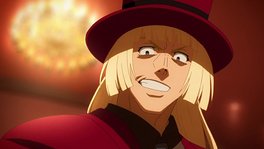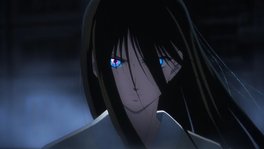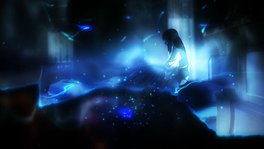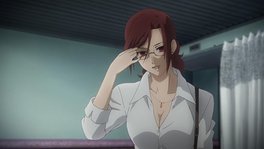



This is the movie that Kara no Kyoukai has been building up to. This is the movie that propels the series from brilliant to astounding. This is one of the best anime movies ever created. It starts with a stark black and white divided screen, the name of the film emblazoned across it, and is followed by a chaotic medley of scenes before settling in with, what seems at first blush, a more traditional narrative. However nothing about Paradox Spiral (Paradox Paradigm the officially translated title) is traditional as it twists different threads together in a story that covers time, death, family, gender and the perception of self in a way that is enchantingly cohesive and utterly enthralling.
it permeates the fibre of the film defining its structure, guiding its antagonists and adorning incidental but important props throughout
Set chronologically after the first film, Overlooking View, it is roughly divided into three interwoven stories. The first has Shiki meet up with Tomoe, a teenager who believes he has murdered his parents despite mounting evidence to the contrary. The second focuses on Mikiya and Touko as they investigate an apartment building that Touko apparently had a hand in constructing. The third and final arc binds the previous two together with a face-off against two powerful sorcerers that play fast and loose with the sanctity of human life and the governing laws of the universe. Surpassing even the previous film's fantasy quotient, Paradox Spiral is the most involved and unfettered indulgence in the fundamentals of the Kara no Kyoukai universe yet and manages to weave them flawlessly into a greater exploration of some less travelled topics.
Read the rest of this entry




Four films into the Kara no Kyoukai series and the expectation is for a quality dip, something thrown together to appease fans and cover some of the source material that wasn't as glamorous or directorially challenging; The Hollow is none of these things, but it is the closest the collection has become so far to being formulaic. Following a similar tempo to the first film and of comparable lengths, whereas the first was meant as a soft-landing to the dense and chaotic universe of the series, this is more preparatory by taking away the focus from Mikiya and letting both Shiki and Toko expand and develop. Toko is no longer just a quirky red-head and the juxtaposition in Shiki's circumstances from film to film is elaborated upon.
Brutality and intrigue draw and engage but without exposition and understanding, the long term entertainment of the audience suffers
Opening moments after the calamitous ending of film two, Murder Speculation Part One, Shiki is taken to hospital and stabilised but remains in a coma for two years, watched over by Mikiya whom the nurses refer lovingly to as a puppy. Upon awakening her vision is besieged by scratchy, ephemeral fissures and hallucinations of death; after attempting to physically exorcise the visions, she is wrongly diagnosed with aphasia and a speech therapist is called in. Touko masquerades as the therapist and tells Shiki of her affliction while reporting back her progress to her new employee, the expectant Mikiya. At night however, spirits roam the hospital and take a deadly interest in Shiki's predicament.
Read the rest of this entry







